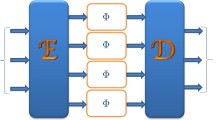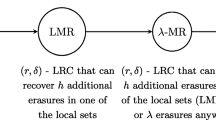Abstract
We classify the time complexities of three decoding problems for quantum stabilizer codes: quantum bounded distance decoding (QBDD), quantum maximum likelihood decoding (QMLD), and quantum minimum error probability decoding (QMEPD). For QBDD, we show that it is NP-hard based on Fujita’s result, and cover the gap of full row rank of check matrices, like what Berlekamp, McEliece, and Tilborg suggested in 1978. Then, we give some insight into the quantum decoding problems to clarify that the degeneracy property is implicitly embedded in any decoding algorithm, independent of the typical definition of degenerate codes. Then, over the depolarizing channel model, we show that QMLD and QMEPD are NP-hard. The NP-hardnesses of these decoding problems indicate that decoding general stabilizer codes is extremely difficult, strengthening the foundation of quantum code-based cryptography.
Similar content being viewed by others
References
Berlekamp, E., McEliece, R., van Tilborg, H.: On the inherent intractability of certain coding problems. IEEE Trans. Inf. Theory 24, 384–386 (1978)
Sipser, M.: Introduction to the Theory of Computation. Thomson Course Technology, Boston (2006)
McEliece, R.J.: A public-key cryptosystem based on algebraic coding theory. Nasa dsn progress report 42-44, NASA (1978)
Bernstein, D.J., Buchmann, J., Dahmen, E. (eds.): Post-Quantum Cryptography. Springer, Berlin (2009)
Bernstein, D.J., Lange, T., Peters, C.: Wild McEliece. In: Proceedings of Selected Areas in Cryptography, pp. 143–158 (2010)
Calderbank, A.R., Rains, E.M., Shor, P.W., Sloane, N.J.A.: Quantum error correction and orthogonal geometry. Phys. Rev. Lett. 78, 405 (1997)
Calderbank, A.R., Rains, E.M., Shor, P.W., Sloane, N.J.A.: Quantum error correction via codes over GF(4). IEEE Trans. Inf. Theory 44, 1369–1387 (1998)
Gottesman, D.: Stabilizer Codes and Quantum Error Correction. Ph.D. thesis, California Institute of Technology (1997)
Poulin, D., Chung, Y.: On the iterative decoding of sparse quantum codes. Quantum Inf. Comput. 8, 987–1000 (2008)
Hsieh, M.H., Le Gall, F.: NP-hardness of decoding quantum error-correction codes. Phys. Rev. A 83, 052331 (2011)
Fujita, H.: Quantum McEliece public-key cryptosystem. Quantum Inf. Comput. 12, 0181–0202 (2012)
Cohen, G., Encheva, S., Litsyn, S.: On binary constructions of quantum codes. IEEE Trans. Inf. Theory 45, 2495–2498 (1999)
Bennett, C.H., Shor, P.W.: Quantum information theory. IEEE Trans. Inf. Theory 44, 2724–2742 (1998)
Nielsen, M., Chuang, I.: Quantum Computation and Quantum Information. Cambridge Univ. Press, Cambridge (2000)
Kuo, K.Y., Lu, C.C.: A further study on the encoding complexity of quantum stabilizer codes. In: Proceedings of 2010 International Symposium on Information Theory and its Applications, pp. 1041–1044 (2010)
MacWilliams, F., Sloane, N.: The Theory of Error-Correcting Codes. North-Holland Publishing Company, Amsterdam (1978)
Pretzel, O.: Codes and Algebraic Curves. Oxford University Press, Oxford (1998)
Stichtenoth, H.: Algebraic Function Fields and Codes, 2nd edn. Springer, Berlin (2008)
Herstein, I.N.: Abstract Algebra, 3rd edn. Wiley, Hoboken (1996)
Grassl, M., Beth, T.: Quantum BCH codes. In: Proceedings X. International Symposium on Theoretical Electrical Engineering, Magdeburg, pp. 207–212 (1999)
Hamada, M.: Concatenated quantum codes constructible in polynomial time: efficient decoding and error correction. IEEE Trans. Inf. Theory 54, 5689–5704 (2008)
Smith, G.: Private classical capacity with a symmetric side channel and its application to quantum cryptography. Phys. Rev. A 78, 022306 (2008)
Chudnovsky, D.V., Chudnovsky, G.V.: Approximations and complex multiplication according to Ramanujan. In: Ramanujan Revisited, pp. 375–472. Academic Press Inc., Boston (1988)
Fürer, M.: Faster integer multiplication. In: Proceedings of the 39th Annual ACM Symposium on Theory of Computing, pp. 55–67 (2007)
Funding
This work was supported by the Ministry of Science and Technology, Taiwan, under Contract MOST 101-2221-E-007-096-MY3.
Author information
Authors and Affiliations
Corresponding author
Additional information
Publisher's Note
Springer Nature remains neutral with regard to jurisdictional claims in published maps and institutional affiliations.
This work was supported by the Ministry of Science and Technology, Taiwan, under Contract MOST 101-2221-E-007-096-MY3. Part of this work was presented at the 2012 International Symposium on Information Theory and its Applications (ISITA 2012), Hawaii, USA, October 28–31, 2012. This work has an arXiv version (arxiv:1306.5173).
Rights and permissions
About this article
Cite this article
Kuo, KY., Lu, CC. On the hardnesses of several quantum decoding problems. Quantum Inf Process 19, 123 (2020). https://doi.org/10.1007/s11128-020-02622-8
Received:
Accepted:
Published:
DOI: https://doi.org/10.1007/s11128-020-02622-8




